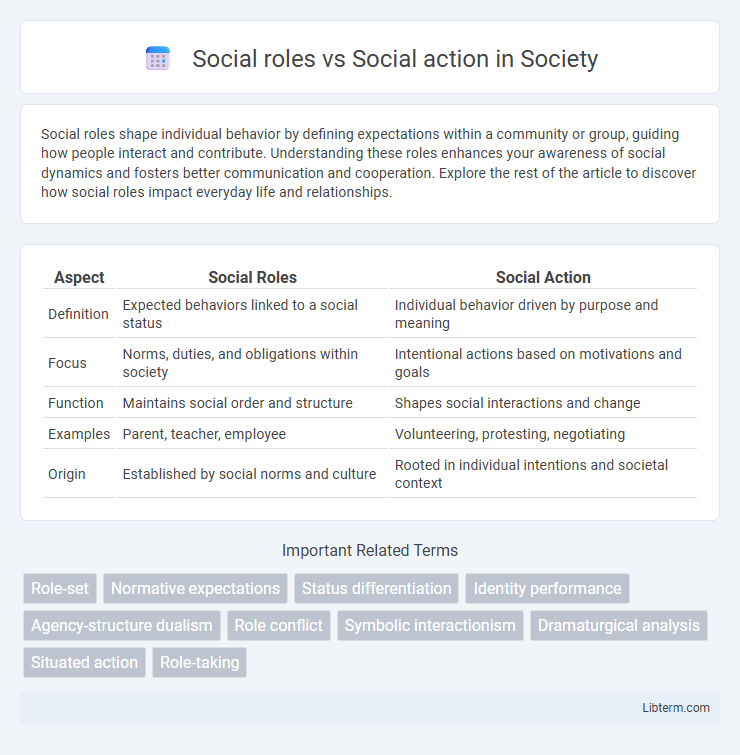Social roles shape individual behavior by defining expectations within a community or group, guiding how people interact and contribute. Understanding these roles enhances your awareness of social dynamics and fosters better communication and cooperation. Explore the rest of the article to discover how social roles impact everyday life and relationships.
Table of Comparison
| Aspect | Social Roles | Social Action |
|---|---|---|
| Definition | Expected behaviors linked to a social status | Individual behavior driven by purpose and meaning |
| Focus | Norms, duties, and obligations within society | Intentional actions based on motivations and goals |
| Function | Maintains social order and structure | Shapes social interactions and change |
| Examples | Parent, teacher, employee | Volunteering, protesting, negotiating |
| Origin | Established by social norms and culture | Rooted in individual intentions and societal context |
Understanding Social Roles: Definitions and Concepts
Social roles are defined as the expected behaviors, responsibilities, and norms associated with a particular position within a social structure, guiding individuals on how to act in specific contexts. Understanding social roles involves analyzing how these roles shape identity, influence interactions, and maintain social order through shared expectations. The concept highlights that social roles are dynamic, negotiated, and often intersect with factors such as culture, status, and power within society.
Exploring Social Action: Meaning and Importance
Social action refers to behaviors directed toward others with meaningful intentions, emphasizing the subjective motivations behind individual actions. Understanding social action is crucial for analyzing how individuals interpret and respond to social contexts, shaping social interactions and order. Max Weber's concept highlights the importance of intentionality and meaning in distinguishing social action from mere behavior.
Key Differences Between Social Roles and Social Action
Social roles refer to the expected behaviors and responsibilities assigned to individuals based on their position within a group or society, while social action focuses on the intentional behaviors and decisions made by individuals to achieve specific goals. Social roles are generally structured and collective, shaped by norms and expectations, whereas social action is dynamic and driven by individual agency and subjective meanings. Understanding the distinction highlights how social roles provide a framework for behavior, while social action emphasizes personal motivation and purposive conduct.
Theoretical Perspectives on Social Roles
Theoretical perspectives on social roles emphasize their function in structuring social behavior and maintaining societal order, with Talcott Parsons highlighting roles as expectations linked to social positions that guide individual actions. Symbolic interactionism, as proposed by George Herbert Mead, interprets social roles as dynamic, negotiated through interactions and shaped by individual interpretation within social contexts. Social action theory, particularly Max Weber's framework, focuses on the meanings individuals attach to their actions, positioning social roles as frameworks that influence but do not rigidly determine personal motivations and behaviors.
Sociological Theories Explaining Social Action
Sociological theories such as Max Weber's interpretive sociology emphasize social action as behavior individuals attach subjective meaning to, contrasting with social roles which are predefined expectations within a social structure. Symbolic Interactionism explores how individuals navigate and negotiate social roles through meaningful interactions, highlighting agency in social action. Structuration theory by Anthony Giddens integrates both frameworks, explaining social roles as patterned behaviors shaped by and shaping ongoing social actions.
How Social Roles Influence Individual Behavior
Social roles provide structured expectations and norms that guide individual behavior within society, shaping actions to align with group standards. These roles influence decision-making processes, emotional responses, and interactions by offering a framework of responsibilities and privileges tied to specific social positions. Consequently, individuals often modify their behavior to meet role-related expectations, ensuring social cohesion and predictability in social interactions.
The Impact of Social Action on Society
Social action drives societal change by influencing norms, values, and social structures beyond the expectations of predetermined social roles. Unlike social roles, which prescribe behavior based on status or identity, social action is intentional and aimed at achieving specific societal outcomes. Its impact is evident in movements for civil rights, environmental justice, and policy reforms that reshape collective behavior and institutional frameworks.
Interplay Between Social Roles and Social Action
Social roles shape individuals' expected behaviors within society, guiding their actions according to cultural norms and collective expectations. Social action refers to behavior driven by meaningful motives and intentions, influenced by personal goals and social contexts. The interplay between social roles and social action highlights how individuals negotiate societal pressures and personal agency, dynamically adapting actions within role constraints to achieve social coherence and individual purpose.
Real-life Examples: Social Roles vs Social Action
Social roles refer to the expected behaviors and responsibilities associated with a specific position in society, such as a teacher managing a classroom and grading assignments. Social actions emphasize individual choices and intentions, exemplified by a student deciding to actively participate in class discussions or challenge the teacher's viewpoint. Real-life scenarios illustrate that while social roles guide general behavior patterns, social actions reveal personal agency within or against those roles.
Implications for Social Change and Development
Social roles structure individual behavior within society, often reinforcing existing norms and stabilizing social order, which can slow transformative social change. Social action, grounded in individual intentions and meanings, drives dynamic shifts by challenging entrenched roles and enabling adaptive development. Understanding the interplay between social roles and social action is crucial for leveraging human agency to foster progressive social change and sustainable development.
Social roles Infographic

 libterm.com
libterm.com